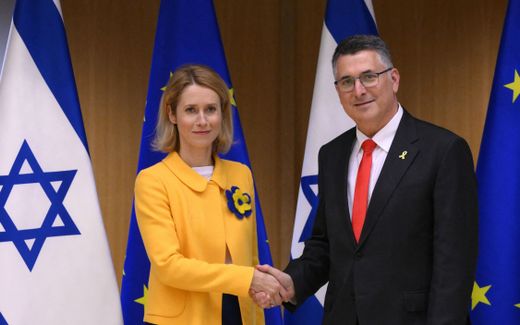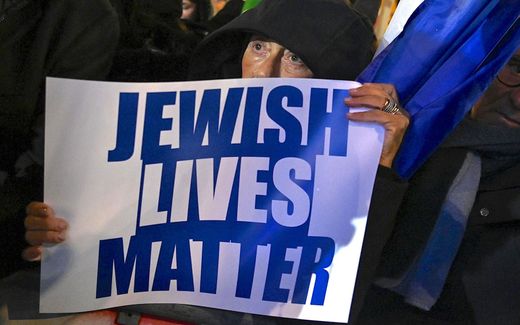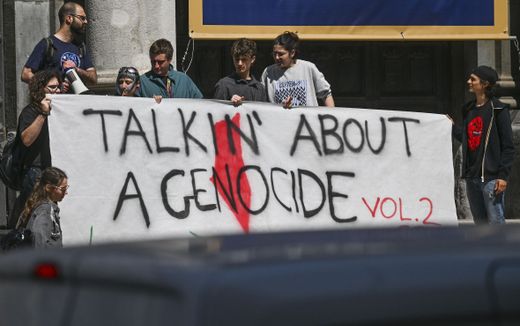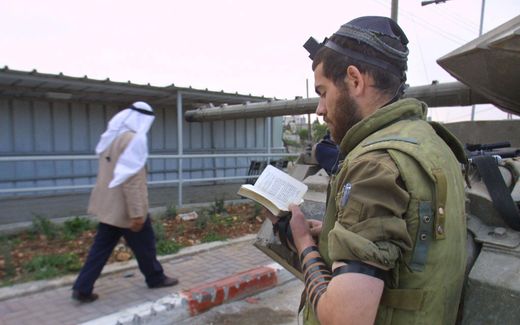Especially now, the EU has the moral task to scrutinise Israel
12-06-2025
Opinion
Jack Nassar

Jews and Arabs among the Palestinian shops in east Jerusalem. Photo AFP, Awad Awad
Opinion
As a Palestinian Christian, Jack Nassar from Ramallah writes to his European brothers and sisters. His family has lived and worshipped in the Holy Land for generations. “I don’t want to confront but to converse”, he says. “To confuse covenant with conquest is to betray the Gospel.”
Stay up to date with Christian news in Europe? Sign up for CNE's newsletter.
Evert van Vlastuin wrote a column recently, Comment on Climate Change Towards Israel: EU Gives the Wrong Signal. I feel compelled to offer a different perspective, grounded in Scripture and lived experience.
For me, it’s clear that Vlastuin’s concern comes from a desire to defend Israel against what he views as disproportionate or unfair international criticism. This is a concern that some Christians share, and others do not. But I believe the article reflects a troubling theological conflation and a moral imbalance that deserves critique – not out of animosity, but as a fellow disciple of Christ committed to truth, justice, and Biblical faithfulness.
Equivalent
One of the most persistent—and spiritually risky—errors in modern Christian discourse, particularly in Europe and America, is the assumption that the modern State of Israel is the direct continuation of the Biblical covenant people of God. However, the assumption that Biblical and modern Israel are theologically equivalent is a misleading and unbiblical claim. Yet, many have, often unknowingly, embraced this.
The Biblical nation of Israel was a theocratic community under divine rule, called to embody God’s justice and holiness (Exodus 19:5–6). Modern Israel is a secular, political state governed by military and strategic interests. Furthermore, it was established in 1948 amid the forced displacement of over 750,000 Palestinians—including around 90,000 Christians as is documented by Kairos Palestine— where entire towns, villages, and churches were wiped off the map.
Equating Biblical and modern Israel is to spiritualise a geopolitical entity in ways the New Testament does not. As Christians, we believe God’s covenant promises to Abraham find their ultimate fulfilment in Christ—not in the political expansion of a modern nation-state (Galatians 3:16, 28–29). The Church is the new covenant community of Jews and Gentiles, united not by ethnicity or land but by faith (Ephesians 2:14–22; Romans 9:6–8).
This has nothing to do with replacement theology—it is fulfilment theology. It affirms that all people are welcomed into God’s family through Christ and that no nation holds divine privilege over others.
Defending the modern state of Israel is not a Biblical obligation—it is a political stance. As such, it should be subject to the same moral scrutiny we apply to all other governments.
Self-defence
Vlastuin’s article presents Israeli military action as self-defence —but remains silent on the structural Israeli violence Palestinians endure daily. That silence undermines the Christian witness.
Suppose Israel has the right to defend itself against rockets, violence and armed resistance. Do Palestinians not have the right to defend themselves against forced evictions, home demolitions, land confiscation, airstrikes, revoked residency rights, travel restrictions, and the military occupation and apartheid system that governs nearly every aspect of their lives?
The principle of self-defence must be applied equally. If only one group can act forcefully to ensure survival—and the other is expected to suffer quietly—we are not dealing with justice. We are dealing with moral hypocrisy.

Scripture warns: “Do not pervert justice; do not show partiality” (Deuteronomy 16:19). And Jesus, who wept over Jerusalem, calls us to love our enemies, yes—but also to challenge oppression wherever it is found (Matthew 23:23; Luke 19:41–44).
Terrorism
Western and Christian media often label Palestinian resistance as “terrorism” while portraying Israeli violence as “security” or “self-defence.” This linguistic sleight of hand dehumanises a suffering people and obscures injustice.
Let’s have a look at some historical examples. The Warsaw Ghetto uprising in the Second World War is celebrated. South African resistance to apartheid is honoured. But Palestinian resistance—even when nonviolent—is condemned and criminalised.
Vlastuin’s article does not ask why Palestinians resist. It assumes that any opposition to Israeli policy must be irrational or antisemitic — even though Palestinians themselves are Semitic and speak a Semitic language.
Resistance to tyranny has precedent in Biblical history. Moses resisted Pharaoh, the prophets confronted corrupt kings, and Jesus overturned the tables of exploitation in the temple (John 2:15). The goal is not to glorify violence but to recognise that resisting occupation and systemic sin is part of the Biblical tradition.
Selective memory
Supporting the modern state of Israel is not synonymous with honouring God’s covenant. The prophetic tradition consistently called Israel back to righteousness—not military expansion.
Seek justice and correct oppression. — Isaiah 1:17
Let justice roll down like waters. — Amos 5:24
By defending Israel unconditionally, we risk repeating the very sins the prophets condemned: national idolatry, hardened hearts, and injustice cloaked in religious language.
I’m not calling anyone to hate Israel or withdraw support. I’m calling for moral clarity—the courage to distinguish political agendas from spiritual convictions and to judge both with integrity. We reject all forms of terror and violence, and we oppose hatred toward any people—Jewish, Muslim, Christian, Israeli, Palestinian, or Arab. We unequivocally condemn the October 7th attacks by Hamas. Our cause is peace, justice, freedom, and the hard but necessary work of telling the truth, even when it’s difficult.
The EU’s role
The European Union’s call to examine Israel’s human rights record is not an attack on Jewish identity. It is a moral responsibility. Israel receives billions in European trade benefits and military cooperation. To question this in light of military occupation, apartheid, and settler terror in the West Bank, including Jerusalem—not to mention the siege and mass atrocities in Gaza—is not “the wrong signal.”
It may be the only signal consistent with Christian ethics and values.
Saying that this call pleases antisemites, as Vlastuin did, conflates critique of a state with hatred of a people. This weakens the real fight against antisemitism and confuses moral reasoning.
We do not welcome antisemites in our struggle or protests. Anyone who uses our cause to spread hatred—whether against Jews or any other group—undermines our mission. We oppose antisemitism as strongly as we oppose Zionism, anti-Palestinian racism, and all forms of injustice and hate.
Covenant and conquest
As Christians, we are called to resist sentimental loyalties and embrace prophetic truth. Our allegiance is not to any earthly nation but to the Kingdom of God—a kingdom of justice, mercy, and peace.
If we invoke Scripture to defend Israel, we must also heed Scripture’s call to justice. If we demand peace from Palestinians, we must also demand repentance from those who occupy and oppress them. If we follow Christ, we must stand where He stood—with the poor, the occupied, the outcast, and the crucified.
To confuse covenant with conquest is to betray the Gospel. To ignore Palestinian suffering is to abandon Christ at the margins. And to silence dissent in the name of loyalty is to forfeit our witness.
I write not to attack but to invite deeper reflection. The suffering of my people, the credibility of the Gospel, and the unity of the Church depend on it.
Jack Nassar is a Palestinian Christian based in Ramallah, Palestine. He holds a Master of Arts in Political Communications from Goldsmiths, University of London, and brings professional expertise across multiple sectors, driving positive change.
Related Articles












